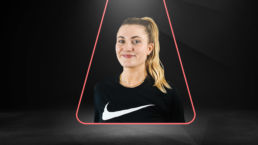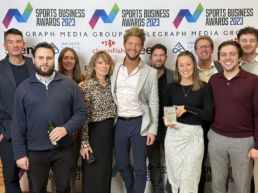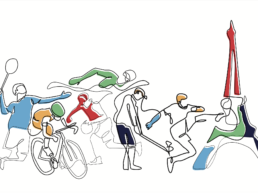Welcome to Redtorch’s She Moves The Game Spotlight Series where we shine a light on the incredible women working in sport (find out more here).
We caught up with Isabelle Chauzy to learn how she unexpectedly found herself working in the world of football, about the fantastic work she has been doing for girls at Bloomsbury Football, and her advice to women working in the world of sport.
Can you tell me a little bit about your current role and the work you do for Bloomsbury Football?
Yes, I’m the marketing manager at Bloomsbury Football – a London-based charity that uses the power of football to support young people across our capital city. My role is to oversee all marketing, PR and socials.
We absolutely believe in the life-changing power of football. That’s very ‘marketing’ of me to say, but what it actually means is our belief that by getting young people on the pitch and by removing barriers to play, they become happier, healthier, more resilient individuals. Every young person should have access to this.
Part of what we do is provide financial assistance so young people from all different backgrounds are able to get on the pitch with us. We have a range of programmes from a higher-level academy to development teams and specialised initiatives for those living with disabilities and for refugees. We cater for anyone aged between 18 months and 18 years.
Basically, my job is to support fundraising efforts aimed at getting more young people on the pitch and building the Bloomsbury Football brand. We’ve been a charity for over five years now and are definitely growing into a brand in this space, leading other grassroots clubs to get involved in conversations. We’re becoming more relevant and trying to inspire young people – not just on the pitch but off it as well.
I love that because here at Redtorch we’re all about ‘making sport more relevant to more people’. I believe sport is relevant to everyone. Sometimes you don’t even realise the impact it has on your life but it’s there.
That’s so true. I wasn’t involved in this world before I got the job. I didn’t watch football. I didn’t play football. I still don’t play football. I was raised by a single mum who isn’t sporty: we didn’t see ourselves involved in the sports world.
I feel I’ve learned a new language because I can now see how universal football is. It’s funny as any space I go to I’m like, ‘Oh yeah, football. I understand what you’re talking about now.’
What I admire about Bloomsbury’s choice in hiring me even without any football experience is that I bring a different perspective to the game. When we start to talk about real, tangible steps to inclusivity in this space, it’s about including people like me who aren’t ‘sporty’.
Although I wasn’t involved in the footballing world, I’m a woman who believes in social impact and the effect movement has on people. I’ve brought something a bit unique, a bit different, to this space, probably not someone the team thought they would hire. But that’s exactly the point: sport is everywhere and should include everyone.
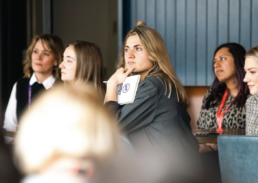
It’s great that you’ve come at it with fresh eyes! There are so many people, in London and the UK especially, who love football but I guess your aim is to reach those it doesn’t yet reach or isn’t yet accessible for.
Yes, particularly when we’re talking about our girls’ programme. Despite being 10 to 15 years older than most of the girls, I do feel I’m close enough to the experience of being a girl at school where I felt self-conscious and not included. I didn’t want to give sport a try because I didn’t see myself in that space. Now I’m bringing that ‘Look, you are included’ to the game. This is what Bloomsbury does. Its marketing department includes people who have loved and played football their whole lives as well as people coming from a completely different angle.
It would be great to hear a little bit more about your background before you got into this. And what inspired you to apply for this role if it wasn’t the football itself?
I think of myself as still being quite young. I got this job when I was 24, after I’d graduated during COVID. I was feeling a bit lost and ended up doing a Master’s in Business which I thought would give me the skills I’d need in any future role that involved having an impact.
I’ve never been the sort of person who’s passionate about only one thing and that can be frustrating – but also very exciting! I strongly believe in lots of things so if I’m aligned with an organisation, its values and mission, I can throw myself into it.
Before getting this role, I was living in the Dominican Republic doing some climate communications and some PR stuff around COP 26. I’ve also worked in the Congo on a documentary about women in peace activism.
I’ve always tried to do things that excite me and when I heard about the job at Bloomsbury, I was excited. I felt I was joining a young team, a fast-growing charity, something I believe in, and a community I grew up in: Archway. The first Bloomsbury session was on a pitch in Camden so it felt quite fortuitous to come back here and have a real impact. That’s how I got involved in Bloomsbury, and it’s been a real learning curve ever since.
Talking of impact, Bloomsbury is no doubt having an impact. What achievements in your career so far are you most proud of?
The thing I’m probably proudest of is what I’ve done to break down barriers in the girls’ game. Bloomsbury looked quite different when I started in 2022 as there weren’t many women in the office, but the team’s really grown since. I’d worked in a period-care start-up before and came in and said, ‘Well, why aren’t we providing products to our girls?’ There’s a massive stigma around menstruation, not only in sport, but we’re providing financial assistance to some of London’s most disadvantaged young people. Period poverty is a thing, so let’s try and go a step further and do more to get girls on the pitch.
We partnered up with Freda, a sustainable care company I’d worked for many years ago. We decided we wanted period products on pitch for every girls’ session and that’s what we’ve done. I’m extremely proud of this because it’s something tangible and close to my heart.
I’m also extremely proud of our Game Changers campaign in King’s Cross. We’ve moved offices since, but we used to work around the corner from the Kings Cross site and I remember starting at Bloomsbury and seeing those boards and being inspired by the content on them. It’s always quite cutting edge, it’s always quite progressive, and it’s always visually beautiful. I remember saying to myself, We’re going to be on those boards one day and we managed to pull it off!
It all happened pretty last minute, shortly after the Women’s World Cup. We shot the 16 beautiful players on our annual trip to St George’s Park where we take over 100 academy players. We turned it around quickly and to see the look on the girls’ faces when they saw the boards was incredibly special. We showed them they belonged there and that they have a voice. Even if you’re 10,12,13,14, you have a voice and you belong in this game. It builds that confidence and I’m so proud of that.
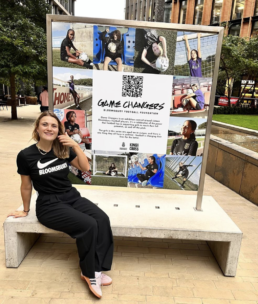
I love the Game Changers campaign, I read about it every day on my way into our London office. When I used to play as a youngster you didn’t see that. I wish there had been similar initiatives back then because I think they’re such an inspiration. Like they say, ‘if you see it, you can be.’
Exactly. The top-level players in the men’s game are icons and role models but seem quite untouchable. We’re getting towards that level in the women’s game now with the likes of the Lionesses and how incredibly they perform.
What we try to do with Game Changers and what we try to do with Bloomsbury is show our young people that they are role models by just coming onto the pitch, showing up and being the best version of themselves they can be. Game Changers was a perfect culmination of that belief because suddenly you’re on a board in King’s Cross, a site that gets 1.6 million visits.
So that’s 1.6 million people seeing these girls and potentially challenging their own stereotypes around what it means to be a girl and what it means to be a football player.
Talking of the Lionesses, do you see a strong connection between success in the women’s game at a professional level and the amount of participation at a grassroots level?
100%. It’s something that’s not all roses. Around the tournaments, we get an increased momentum of girls wanting to get on the pitch. There’s a huge spotlight on inclusion and celebration of women in sport, and that’s so useful. It’s important for the girls to see women representing the top level of sport because it’s becoming normalised and they’re seeing themselves represented – which in turn makes them want to get on the pitch.
What we’re seeing now, however, is a slight slowing down of this rate of girls who want to get on the pitch. There are still very deep gender norms and stereotypes around football so it will probably take a while to see true equality. I’m not sure what that will look like yet because the two games aren’t exactly the same but I realise its importance.
The reverse of the question is that we feel real responsibility to transform the future at the grassroots level. Right now, we’re running a campaign throughout March called A Seat at the Table. It’s all about celebrating the female coaches at Bloomsbury in order to encourage more girls to consider coaching and more women to get on the pitch and coach. When boys and girls are coached by women as well as men, they think of it as normal. They don’t grow up with the same preconceptions as previous generations.
It’s so easy to completely separate women’s and men’s football. In reality, if you think of football as a whole industry, we need more women not just on the pitch but in all roles on both sides of the game. We want to encourage women to be comfortable in the sports industry no matter what their role. If you’re good at what you do it shouldn’t matter if you’re male or female.
Exactly. Ideally, we’ll get to a point where it’s based just on skills. If you’re able to do the best job, you’ve got the job.
We’re not there yet as there are still so many barriers around perceived gender roles. Women have been coached by men for a long time and they can be the best person for the role. Why not the reverse? There’s something powerful about the thought of there being a full-time female professional coach at a men’s top-level team. Why shouldn’t a group of men listen to a woman if she’s the best person to do the job?
It’s also to do with the talent pipeline, isn’t it? There is the reality that women haven’t had as much opportunity to reach the highest levels of the game. As long as current policy decisions and investments allow, there’s no reason women shouldn’t get to those levels if they’re accepted onto those same courses and achieve the same qualifications.
A discussion that came up at a recent Women In Football conference I attended was around using quotas to try and get more women ‘in the room’. For example, saying that a football club’s board should have X number of female representatives. Do you have any thoughts about the need for quotas in order for us to reach the point where we no longer need them?
I don’t have an exact answer as I have mixed feelings about quotas, probably from when I studied politics at uni and did my dissertation about women in peacekeeping. It was about the documentary I worked on. At the time I was like, ‘No, quotas are tokenistic. We don’t want women to become tokens. We don’t want their work to be devalued when they are in on a quota.’
Then I saw a completely different perspective when I went to the Congo. Some of the women said to me, ‘Okay, but we’re not even going to get in the room.’ So yes, there is a risk of tokenism, but how do we start changing attitudes if the pace of change is so slow that it’s not even happening?
That made me realise there is a world in which, unfortunately, there might be a first generation of women who are seen as quotas or as tokens of change, but actually show up in the room and are the best person for that job. They will quickly prove that and challenge the expectations and beliefs of the people in the room. Then that change will multiply. I guess in an ideal world, we wouldn’t need quotas. But in the real world, seeing the barriers that we’re up against in this industry – and most probably in every industry – quotas at least get people in the room who can then prove they deserve to be there.
There’s certainly still work to do but what is the best part of working in football and specifically the charity side of things?
I’ll probably start with the charity side because that’s what attracted me to this space. I’ve always known I wanted to believe in what I’m doing and make an impact. Corny as it sounds, I want to leave the world a better place because I was in it! That’s driven me: do good, whatever that looks like.
When I joined this industry, I had about a year when I felt like an imposter and found it difficult to believe my knowledge was up to scratch as I didn’t totally understand what I was talking about. I didn’t feel I belonged in the room. About a year in I began to think, I’m bringing a different perspective to this space. So I’ve flipped my perspective!
What I love about working in sport and in particular football is that it’s always current – we’re constantly in conversations so it’s pretty easy to get placed in the press. There’s always something going on with football and we often have something to say about it.
When it comes to my team and the people in football, they are very health conscious, they’re energetic and they tend to want to self-improve. It’s quite a high-performance mindset at any level of the game. It’s encouraged me to look at myself as to how I could be working more effectively and how I can bring more movement into my life. It’s been such a positive place to work, both in terms of the impact but also in terms of my own personal development.
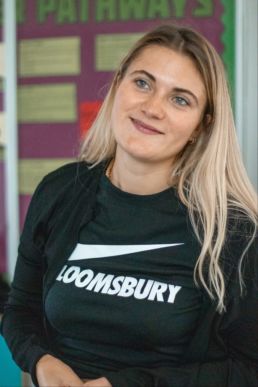
Working within a sports-mad team here at Redtorch, I totally get that. We spoke a bit about the relationship between the professional and grassroots levels. How important is diversity and inclusion to grassroots football and how is Bloomsbury trying to help make it the most inclusive world it can be?
I love this question. As I said before, we see grassroots as being the future of the game. Everyone can play football, that’s the beauty of it. It’s also a very accessible sport in theory, although that’s often not reflected at the highest levels of the game. It’s about making sure we’re creating opportunities for the talent of tomorrow and ensuring that everyone is included in that talent pool. At Bloomsbury, there are probably two key goals: accessibility and inclusivity.
1. Accessibility
We see logistical barriers, particularly in London, where football just isn’t particularly accessible. That’s the truth. Pitch space is limited and therefore pitch prices are super expensive, making it expensive to join a team. And that’s not even taking into account that you may have to travel over an hour to get to one. It’s a massive barrier if you’re a young girl expected to travel in winter at 8p.m.
We have a financial assistance model, providing bursaries and subsidies – from 50% to 100%. We never want someone to be priced off the pitch. We are active all over London, too, working in lots of communities which means there will be a Bloomsbury Football session for you within a certain kilometre radius of your home. We’re really trying to tackle the logistical barriers in the game.
2. Inclusivity
This is more about societal barriers – the stereotypes and mindsets around the game. That’s where I come in. How are we marketing ourselves? How are we showing that we are a diverse community and that everyone is welcome at Bloomsbury? Are we showcasing all our young people on our social channels? Are we championing female coaches? Are we talking about periods?
We’re trying hard to deal with these wider societal stereotypes to show young people that once they get on the pitch with us, they’ll have fun. They won’t feel left out and hopefully they’ll want to keep coming back.
We touched briefly on some of the campaigns you’ve worked on. There have been a few really cool projects during your time at Bloomsbury. Can you tell us a bit about the Game Changers and the period projects, how they came about, and what you wanted to achieve?
I’ll talk about Game Changers first. As I’ve already mentioned, it was a creative dream of mine to take up space and talk about Bloomsbury in King’s Cross because it was local. We have strong roots working with partners in the area as well; we run tournaments and leagues with La Liga and are a Nike Partner Club.
Game Changers went through a couple of iterations. Essentially, I pitched for the space with quite a few ideas. One I thought was especially relevant was talking about the girls’ game and how football changes girls’ lives around the Women’s World Cup.
Pretty early on they said no, the space was booked. But as the tournament evolved, they reached out and said, ‘Actually this is pretty huge, let’s do it.’ And I responded, ‘Yeah, it is huge. I’m really glad you can see that now.’
The reason why it’s called Game Changers is because Bloomsbury Football’s tagline is changing the game for young people in London. We believe everyone involved in our community are game changers in different ways. We went down to St George’s Park where we work closely with our young people. I asked coaches to pull out the girls who either came to every single session and really showed up on the pitch, or the more confident ones who might want to be involved. A lot of young people would be embarrassed to be on camera. And that’s totally fair.
So we chose a range of girls who represented different parts of the game, different backgrounds, because we wanted everyone to feel represented and it just kind of grew from there. I did the shoot with Millie Noble, an amazing photographer I met through someone who works on our period project.
Everything was quite serendipitous – we did the shoot in a day, put together some copy and it was up. The rest is history! It happened very fast once we had got the all-clear to go.
The period project was something I began thinking about early on. We began the project in February 2022 and had launched it by October. In that time, we upskilled our coaches and our community via internal calls and we worked out how to make the project succeed long term. The long and short of the project is our belief that periods are preventing girls from getting on the pitch.
If we normalise conversations around periods and how understanding our menstruation can help us improve performance, we make girls feel it’s no longer a problem happening to them, but rather something telling them the state of their health. Much the same as having a first aid kit on pitch, having period products available removes another barrier; it also ensures that girls from families unable to access period products can easily be involved in the game.
The period project works on two levels: provision and educational workshops. Our first one was with Olympian swimmer Hannah Miley MBE, who came down from Scotland for a weekend with our girls and coaches. It was all about understanding our bodies, training with our cycles, the right language to use. We believe that education is tackling the stigma in our community.
Obviously, there are a lot of male coaches in sport, especially in football. Do you do anything specifically to help them understand as well?
Yes, the majority of our coaches at Bloomsbury are still men. They are the ones who are attending our workshops. We don’t want this to be just for the girls. The girls coming into the workshop also bring their parents, their mums, their dads. We try and do one workshop once every season. And we had dads attending with their daughters at the first one we did with Hannah Miley.
I feel very lucky that I work in a community where people are open to change and open to ideas and having these conversations. But even with our own community, there was some lack of understanding as to the importance of this – a bit of ‘Why should we? Why are we saying we’ll do this when it’s a choice?’ Well, girls aren’t choosing to have periods so it’s not really a choice.
We’ve got to the point now where our male coaches feel more able to discuss these things rather than being afraid of seeming ignorant. It’s hard to ask good questions when you don’t even know where to begin; it was about going back to basics and saying, ‘You know what? We’re not taught this in school, so don’t feel embarrassed. The education system failed us. We don’t talk about this in wider society so let’s all learn about the different phases of menstruation.’
It’s also about the girls knowing that their male coaches are not going to freak out when they ask questions. Your coach, who might be a man, knows what a period is. When you come to him asking for a tampon, he’s not going to go red and panic. He’ll say, ‘Sure, they’re over there. Do you need to rest more today?’ He’s going to know what that means.
Talking of coaches, do you have a particular role model or someone who has helped you get where you are today?
This is always a funny question because I’ve never been the sort of person to look at one person and say that’s a life I want. I’m still in the process of creating my life and making choices that feel aligned with who I am. This type of career progression isn’t something that’s celebrated much in our society. There’s a lot of ‘I had a dream when I was 11 years old and that was my purpose.’
I didn’t have that and still don’t. I feel very aligned where I am right now, but I don’t know what my dream is. I’m in the process of figuring it out and that’s okay.
I’m deeply inspired by the people I work with, particularly when I started at Bloomsbury. A lot of the coaches are aged 17/18/19/20 and there’s a real maturity and self-assuredness that comes from coaching young people. You have to hold space for all these individuals who you know are developing and have their own stuff going on outside of the pitch. I was so inspired by the confidence of the coaches and that’s rubbed off on me a bit.
I also enjoy working in a start-up type environment. Bloomsbury hasn’t been around for that many years. Our CEO Charlie, who started Bloomsbury when he was 22, our Academy Manager and the whole team are taking it upon themselves to grow this charity. It’s a lot of work. For two years I ran the marketing department alone which can sometimes seem a lot of responsibility. I’ve only just hired my first full-time person.
You need to realise it’s actually possible, believing in yourself and putting yourself into spaces you maybe didn’t imagine you’d be at the age of 24/25.
Another thing, I was listening to the High Performance podcast, which I hate myself for saying because it’s got quite a target audience some of the time, but Jamila Jamil did it this week and I love her. She’s very honest about who she is.
She said something at the end, ‘I treat imposter syndrome as if I’m crashing a wedding. I try and dance and get as much free cake as I can.’ She doesn’t wait for people to tell her she doesn’t belong. She just puts herself in places where she might not feel qualified and tries to have the most fun possible and do what she can in that space. That’s probably what I’m doing in football. I do feel imposter syndrome a lot of the time, but I’m trying to believe that what I’m doing is good enough and trying to have fun while I’m doing it.
That’s very good advice to live by! What is the best piece of advice you have received, and do you actually manage to stick to it?
This is a great question because there’s a lot of ‘live, laugh, love’ mentality but you’re not actually doing that. It’s hard to be consistent and it’s hard to show up every single day as a person you want to be. The thing I tell myself the most when I get stuck in fear or imposter syndrome or by my perfectionism – I honestly do get held up by that – is to take ‘messy action’.
How that appears in my work is knowing I’m not going to be perfect. We work with young people so things never go to plan, but you have to meet them where they are. You can’t plan the shoot and make it all go perfectly. So … take messy action, just do it. It’s about feeling the fear and doing it anyway.
And it often does go right. We’re all just meeting ourselves where we are and trying our best. I am young. I’m not going to pretend I know everything. I just take messy action and learn.
I love that. What advice would you give to girls or women who want to kickstart or progress their career in the sports industry?
Well I’d say there’s the tangible stuff that you probably get told by everyone, which is the power of networking. It’s particularly relevant for young people coming out of school who think, ‘They don’t want to talk to me, I have nothing to offer.’ In fact, if you’ve asked someone politely for 10 to 15 minutes of their time and say, ‘This is where I am, I’d love to hear about your career path,’ more often than not people will want to talk about themselves. This interview is a good example of that. People like to feel they’re helping which is a great piece of advice. Build a network of peers around you, but don’t be afraid to reach out to people you might think are too senior to talk to you: in all likelihood, they’ll give you 10 minutes of their time.
For the sports industry as a whole, coming from someone who didn’t imagine they would be in this space, I’d say think outside the box. Be flexible with your next step. Often when you’re young, you think this is the job I’m going to be in forever. That’s not the reality. Be open to learning, be open to following up on exciting opportunities. Even if it’s not in the sport you might want to end up in, you can be having an impact. I could be working in cricket and it could be cricket for good. I love being in the football space, but the power of movement is what we fundamentally believe in.
So, my advice in a nutshell: don’t be too precious about the early stages of your career, follow things that excite you, follow where you can make an impact.
We hope you enjoyed reading about Isabelle’s amazing work at Bloomsbury Football. We feel truly inspired by her goal to break down barriers for girls in football and inspiring young people on and off the pitch.
You can find out more about Isabelle’s work at Bloomsbury Football via her LinkedIn and the Bloomsbury Football website.
Keep an eye out on our website and LinkedIn as we continue to highlight extraordinary women in sport through She Moves The Game.
Rozie Slack
Hi, I’m Rosie. A football mad, crazy horse lady… a rare species! Spend most of my life on social media to keep up with the latest news and hottest trends.
My most memorable sporting moment is …
My first ever trip to Old Trafford to watch Manchester United play (despite the fact we lost).
I am happiest when …
Spending time outside with my horse… even in the rain!
The sports person that best represents me is …
John Whitaker – always calm and collected under pressure.
The three things at the top of my bucket list are …
1. Go on a horseback safari
2. Get a dog of my own
3. Watch England lift a major international football trophy
A quote I try to live my life by is …
“I don’t do stress… it gives you wrinkles” - Me

